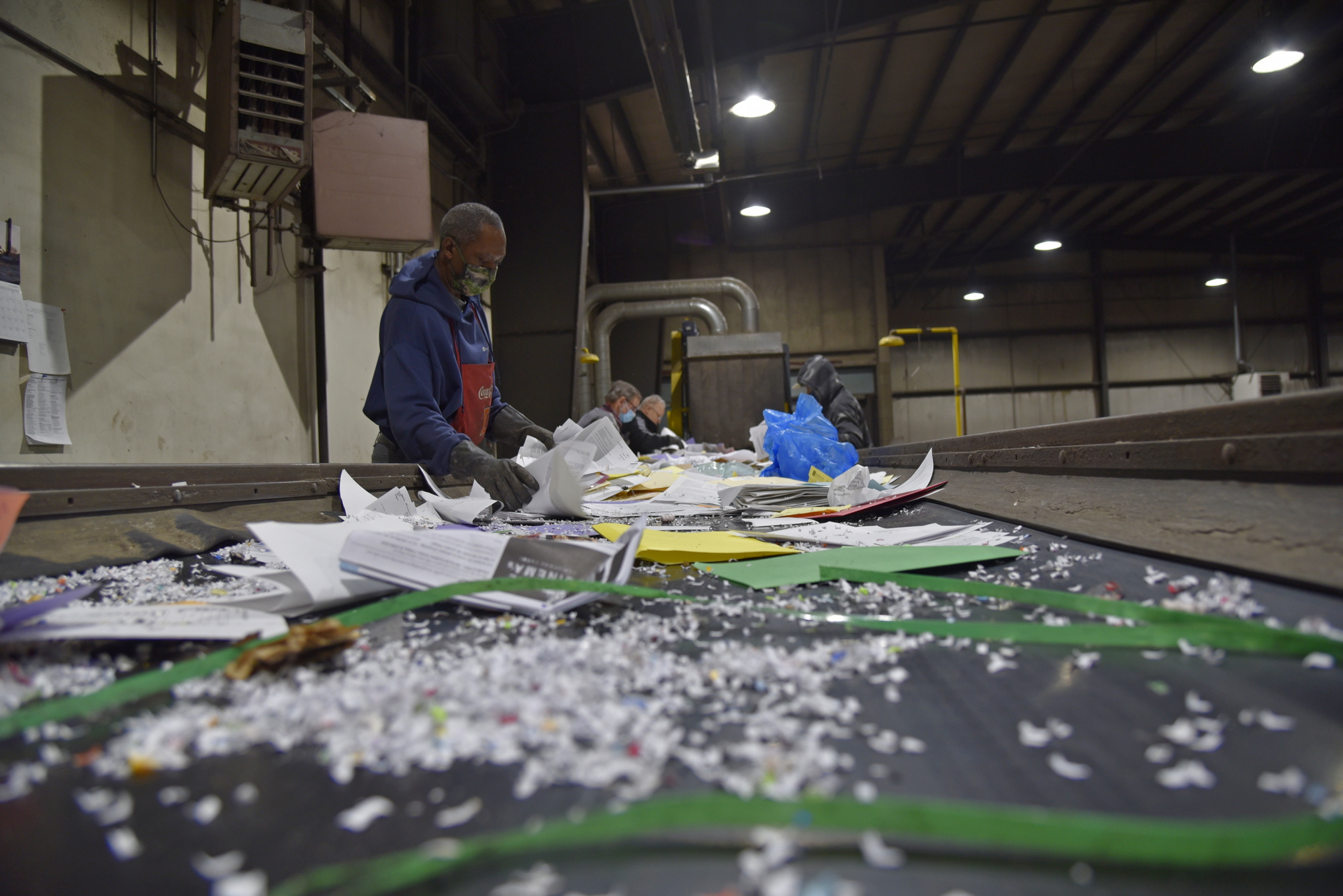Waste Management & Recycling
The F&S Waste Management department provides campus-wide recycling and waste hauling, with an aim to continuously reduce the total volume of waste being sent to a landfill. The Illinois Climate Action Plan (iCAP) sets a vision of Zero Waste for campus, and the State Waste Reduction Plan provides a five -ear plan for continuing to reduce total landfill waste.
There are more than 3,000 recycling bins in campus buildings for paper, plastic bottles #1&2, and aluminum cans. There is also a newspaper and cardboard drop-off location at the southeast corner of Oak Street and Kirby Avenue in Lot E14.
- What is recycled?
- Paper
- Cardboard
- Plastic bottles #1&2
- Aluminum cans
- Scrap metal
Need your container emptied or picked up?
Personal Paper Tote: For desk use, to be emptied into medium and larger paper recycling totes by the employee in their work area.
Request
Medium Paper Tote: For placement in general areas, this tote is delivered by Waste Management & Recycling personnel and emptied by Building Service Workers (BSWs).
Request
Large Paper Tote: For larger clean outs in general areas, this receptacle is offered in secure or standard versions. These bins are emptied by Waste Management & Recycling staff on a “call in’’ or regularly scheduled basis.
*** Please ensure all large paper totes are never over ¾ full for service to be performed
Request
Cans and Bottles Tote: For general areas, these totes are delivered by Waste Management & Recycling staff and collected by BSWs.
Request
Swing Pan: For small to medium size projects, these pans are rear-loaded, and range in size from 4-8 cubic yards or 1-3 pickup truck loads, and are offered in high or low-back options. This receptacle works well for hard to reach areas and areas with limited space. These pans are delivered and serviced by Transportation & Automotive Services.
Request
Front Load Pan: For use with special events, this pan is picked up with a large front-end loading truck. Sizes range from 2-8 yards and are intended for general use trash. These pans are not intended for construction debris. Please call to inquire about larger load pan options.
Request
Roll-Off Pan: For medium to large projects, these receptacles are rear-loaded and are offered in 20 yard size or around 7 pickup truck loads. These pans require a large footprint, so substantial space is required for placement. Please call before starting project work to check availability.
Request
3 Bin: For offering multiple waste disposal options in one convenient location.
Request
Recycling Accepted Materials List and Tips
Bins for Paper
Acceptable:
Office Paper: All Types
Newspaper
Magazines
Journals
Envelopes: All Types
Junk Mail
Ream Wrappers
Books
Phone Books
Manila and File Folders
Unacceptable:
Cardboard *
Carbon Paper
Tissues
Fax Paper
Candy Wrappers
Coffee Cups
Metal Report Covers
Paper Towels
Photographs
Blue Prints
Deskside for Paper Blue Bin
Use a deskside paper bin to collect materials for personal transfer to a full-size paper bin.
Bins for Bottles & Cans
Acceptable:
Plastic bottles (#1 & #2)
Aluminum
Unacceptable:
Non-bottle shaped plastics
Steel, Tin, Glass
*Cardboard
There are cardboard dumpsters placed at select locations throughout campus. F&S is working to create an online map for your reference. In the meantime, you may place campus cardboard in any of the dumpsters marked as “cardboard only.”
*For individual buildings, contact facility managers or Building Service Workers (BSW) for best cardboard recycling practices.
Books
To recycle large quantities of books, please call Waste Management & Recycling at 217-244-SAVE or email recycling@illinois.edu.
Recycling Tips
Recycling in the Office
- Make two-sided copies. Save paper at the copy machine and space in your filing cabinet.
- Distribute memos and drafts through e-mail instead of making copies.
- Reuse envelopes for campus mail.
- Print short memos on half sheets of paper.
- Route memos and subscriptions.
- Purchase supplies made from recycled materials — complete the loop!
- Use the back of scrap paper to print draft copies of reports.
Recycling in Class
- Use two-sided copies for handouts and exams.
- Submit assignments electronically.
- Use notebooks completely before recycling them.
Recycling at Home
- Bring your own container to the grocery store and buy goods in bulk.
- Buy products made from recycled material that come in recyclable containers.
- Pack your lunch in reusable containers.
- Build a compost pile.
- Donate unused clothing and household items to community organizations.
General Tips
- Use your own mug – it saves paper cups and money.
- Bring your own bag when you go to the store. (If everyone in the U.S. reused their grocery bags just once, 60,000 trees would be saved.)
- Use one paper towel instead of two to dry your hands.
- Place recyclable items in appropriate recycle bins.
Reduce, Reuse, Recycle!
More
More than 120,000 fluorescent fixtures are installed in campus facilities. To avoid releasing mercury into landfills, the Laborer Electrician Shop has been recycling lamps since 2000. Used fluorescent lamps are managed on campus under the Universal Waste Rule, and must be sent for proper disposal/recycling.
Lamps Serviced by F&S
Lamps serviced by F&S are appropriately sorted and sent for recycling. Campus units have two options:
- Submit a work request to have mercury-containing lamps replaced and managed by F&S. There is a charge for this service, which includes labor, replacement lamps, and lamp recycling.
- Replace the lamps internally in accordance with Illinois Environmental Protection Agency (IEPA) regulations. Then submit a work request for pickup of the used lamps by F&S. For a small fee, F&S will pick up used lamps and prepare them for shipment to a recycler.
- Campus units do not need to keep records of lamps disposed of by F&S.
Did You Know?
99% of all university lamps are recycled.
Contact
Sharon Ball, Foreman
Laborer Electrician Shop
217-333-4338
slball@illinois.edu
Lamps Not Serviced by F&S
There are two situations where lamps are not serviced by F&S, unless a work request is placed by the campus unit.
- Campus units that manage their own lamps, including the Housing Division, Illini Union, State Farm Center, Krannert Center for the Performing Arts, and the Division of Intercollegiate Athletics.
- Lamps that are not serviced because they are associated with an item that is not part of the facility structure, including lamps in laboratory chemical hoods, incubators, cold rooms, and greenhouses.
Required Procedures for Lamps Not Serviced by F&S
No lamps, regardless of mercury content (with or without green end caps), can be placed directly in the trash. Unprotected low mercury lamps pose a hazard to Waste Transfer personnel and the environment. Once a fluorescent lamp is removed from a fixture, it must be stored in a closed container. This container can be the original box (closed — no flaps open), or any other container that can be closed completely to protect lamps. The container must be labeled “Used Lamps” and marked with the date the first used lamp was placed in it. Used lamps should not be left uncontained or in an area where they could be broken. Submit a work request to have the used lamps picked up. This is different from having F&S replace the lights. For a small fee, F&S will pick up used lamps and prepare them for shipment to a recycler. The IEPA requires that boxes of lamps can be stored no longer than one year from the accumulation start date placed on the box.
Broken Lamps
If a used lamp is broken, the remains must be cleaned up immediately and stored in a sealed, puncture-resistant bag. Label the bag “Broken fluorescent lamp(s)”. Submit a chemical waste pickup request to have the bag picked up by the Division of Research Safety. The UI# for mercury lamps is 7655. Please note on the pickup request form that the lamps are broken.
Coca-Cola is partnering with the University of Illinois Urbana-Champaign on a year-long campaign to bring recycling awareness to the campus. The company is partnering with the Division of Intercollegiate Athletics, University Housing, the Illini Union, the Institute for Sustainability, Energy, and Environment, F&S, and others to keep plastic and metal drink containers out of the campus waste stream.
Among the many things Coca-Cola is providing are 60 new portable side-by-side receptacles for recyclables and landfill waste. Look for these bins at all major events on campus this year! Help join this campaign and take simple, sustainable actions to help us reach zero waste goals on campus. Your individual, departmental, and unit efforts are making a difference!
“Don’t Waste” images for social media, digital signs, and newsletters are also available for download and use across campus.
Ready to throw away your used disposable masks (e.g., allergy, medical, N95)? Approximately 50 collection boxes are available on campus to help you recycle these types of face coverings. Simply put the masks in a sealed bag, place the bag into the box, and then sanitize or wash your hands after completing the drop-off.
F&S collaborated with TerraCycle to recycle disposable masks across campus. The program is free to university departments and units thanks to Student Sustainability Committee support.For questions about single-use mask recycling or to request a container in your building, contact recycling@illinois.edu.
Related Links
Featured Providers









